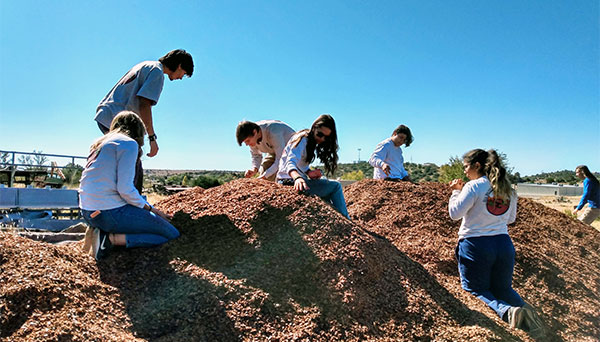Silver City Carboneers
Organization: The Upper Gila Watershed Alliance
This non-profit watershed protection and conservation organization works to promote the long-term health of the Upper Gila Watershed and its communities of life.
Location: Silver City, New Mexico; The villages of Bayard, Hurley, Santa Clara, San Lorenzo, and town of Silver City.
Country: United States
Other Organizations Involved: Southwest New Mexico Council of Governments; Southwest New Mexico Arts, Culture, and Tourism; Town of Silver City; Trollworks, LLC; Youth Conservation Corps; Silver City Watershed Keepers; Stream Dynamics; Cobre School District; Silver City School District; The Commons: Center for Food Security and Sustainability; Civilian Climate Corps staff; Participating students; School teachers, maintenance workers, food servers, parents, in participating school districts; Land managers/agriculturists who use the inoculant product; Gila/Mimbres Community Radio
 ©Carol Ann Fugagli
©Carol Ann Fugagli
Background
Climate-related fire, drought, water scarcity, and extreme heat increasingly threaten food security in the culturally diverse (60% non-white) and economically challenged community of Grant County, New Mexico, including Silver City and the rural Mining District. Adapting to these climate-related impacts, building community resilience to climate change, and promoting environmental justice through the development of equitable solutions is the principal goal of the Silver City Carboneers: a diverse group of local citizens that have been working together to address climate change by building partnerships, weaving together local knowledge and resources, and developing a model Civilian Climate Corps (CCC). This proposal is the result of that fruitful collaboration.
Goals
Our goal is to integrate education with innovation by combining elementary school-based food resilience labs with emerging soil restoration technologies.
Main activities
The food resilience labs involve students and teachers at six local grade schools in a composting pilot project that creates jobs and simultaneously addresses school cafeteria food waste, fire risk, and food insecurity in our community. In our climate change-threatened forests, thinning projects designed to reduce fire risk also provide a biomass waste stream. Our project will capture biomass from both waste streams (food and forest) and combine them in Johnson-Su compost reactors to be built and managed by our new Civilian Climate Corps employees at each food resilience lab location.
Outcomes
By training and engaging teachers, food service employees, and students in this composting program, we will raise awareness of food waste and insecurity issues, promote environmental stewardship, and improve the food-related practices of participants. Examples set by these pilot programs in elementary schools and a local community service hub, will inspire the broader communities to expand composting by building and using Johnson-Su reactors that create a static, fungal-rich compost that can be used to restore degraded soils through fungal inoculation, which in turn increases local food production.